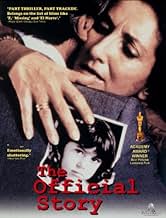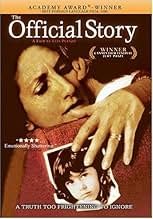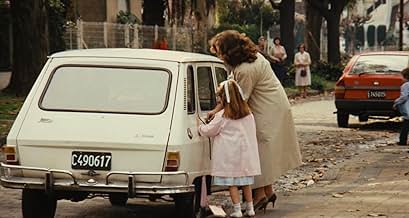IMDb RATING
7.7/10
11K
YOUR RATING
During the final months of Argentinian Military Dictatorship in 1983, a high school teacher sets out to find out who the mother of her adopted daughter is.During the final months of Argentinian Military Dictatorship in 1983, a high school teacher sets out to find out who the mother of her adopted daughter is.During the final months of Argentinian Military Dictatorship in 1983, a high school teacher sets out to find out who the mother of her adopted daughter is.
- Director
- Writers
- Stars
- Won 1 Oscar
- 25 wins & 9 nominations total
- Director
- Writers
- All cast & crew
- Production, box office & more at IMDbPro
Featured reviews
In the powerful 1985 film The Official Story, Director Luis Puenzo tells the story of a teacher's awakening to conscience at the end of Argentina's "Dirty War" of the late 70s and early 80s. As in Pinochet's Chile, the military secret police sought to consolidate their power by routinely torturing and murdering students, political activists, opponents of the regime, and even expectant mothers. Many ended up as desaparecidos, people taken by the government and not returned. The film is about one mother's search for the truth about her adopted daughter and her discovery brings harsh political reality very close to home.
In The Official Story, Alicia (Norma Aleandro) lives a comfortable middle class life. She teaches History to high school students and enjoys a family that includes her well-to-do husband Roberto (Hector Alterio) and 5-year old adopted daughter Gaby (Analia Castro). Not used to asking questions, she believes whatever she has read in history books and is confused when one of her students tells her that "history is written by assassins." She sees the demonstrations of the "Mothers of Plaza de Mayo", a group seeking information about missing family members but remains uninvolved. When her friend Ana (Chunchuna Villafane) visits after living in exile for many years, however, she learns, in an intensely emotional scene, that Ana had been imprisoned and tortured by the police trying to locate her husband, a suspected "subversive".
Ana tells Alicia that many others had "disappeared" and that babies had been taken from their mothers and given to childless friends of the junta. Alicia begins to wonder if her own child was the daughter of a political victim and questions her husband but when he is evasive, she suspects that he may be hiding a dark secret. Although fearful at the prospect of losing Gaby, Alicia is determined to find out about her daughter's past and begins to search hospital records and government archives. Ultimately, she must confront her own responsibility in a climax of shattering force that underscores the tragedy of political ideologues who would rather destroy family solidarity than risk losing power.
In The Official Story, Alicia (Norma Aleandro) lives a comfortable middle class life. She teaches History to high school students and enjoys a family that includes her well-to-do husband Roberto (Hector Alterio) and 5-year old adopted daughter Gaby (Analia Castro). Not used to asking questions, she believes whatever she has read in history books and is confused when one of her students tells her that "history is written by assassins." She sees the demonstrations of the "Mothers of Plaza de Mayo", a group seeking information about missing family members but remains uninvolved. When her friend Ana (Chunchuna Villafane) visits after living in exile for many years, however, she learns, in an intensely emotional scene, that Ana had been imprisoned and tortured by the police trying to locate her husband, a suspected "subversive".
Ana tells Alicia that many others had "disappeared" and that babies had been taken from their mothers and given to childless friends of the junta. Alicia begins to wonder if her own child was the daughter of a political victim and questions her husband but when he is evasive, she suspects that he may be hiding a dark secret. Although fearful at the prospect of losing Gaby, Alicia is determined to find out about her daughter's past and begins to search hospital records and government archives. Ultimately, she must confront her own responsibility in a climax of shattering force that underscores the tragedy of political ideologues who would rather destroy family solidarity than risk losing power.
Its hard to convey just how moving this movie is. Its absolutely haunting, I thought about this flick for days afterwards. I don't think it represents the experiences of many Argentines during the era of the juntas, but it clearly shows how awful those times were and why Argentines never want to return to that situation again.
Adoption can be a harrowing business at the best of times, and the final scene of 'La Historia Oficial' probably represents The End of the Beginning rather than The Beginning of the End. The real drama almost certainly still lies ahead when sweet little moppet Ana discovers the reality about her parents; as teenaged Ann Blyth traumatically did thirty-five years earlier in the Goldwyn production 'Our Very Own' (1950).
A searing political exposé situated in the immediate aftermath of Argentina's Dirty War (1976- 1983), director Luis Puenzo's second feature THE OFFICIAL STORY became the first Argentinian movie to snatch Oscar's BEST FOREIGN LANGUAGE PICTURE laurels.
In 1983, the seemingly perfect life of a middle-class high-school history teacher Alicia Ibáñez (Aleandro) starts to crack when she begins to suspect the birth parents of her adopted daughter Gaby (Castro, an elfin darling), now 5-year-old, might be victims of political persecutions during the military dictatorship. She is determined to find out the truth and inexorably clashes with her husband Roberto (Alterio), who is a well-off government representative and might be in the knowing from the very start.
Puenzo and his co-screenwriter Aída Bortnik import a limpid script to set Alicia to embark on a late-but-better-than-never realization of her country's buried horror which implausibly has been eluded by her until that point, as one of her colleagues Benítez (Contreras) jests that nothing is more gratifying than a guilty bourgeois woman.
What makes Alicia tick is the return of her best friend Ana (Villafañe) from abroad, during an escalatingly poignant two-hander from the two magnificent actresses, Ana confesses to her that she was subjected to torture by the secret police (she is an associate of a subversive) and was forced into exile. Ana's account jolts Alicia into facing up with that troubling question, at the same time, a subplot pertains to the rebellious polemic of Alicia's students (atrociously played by actors much maturer than high schoolers) also vouch for the progress on her conscience. When she finally meets Sara (Ruíz), possibly Gaby's biological grandmother, she bestirs herself with a final attempt to reason with her intransigent husband.
Apart from the film's polemical angle in cashing in on a topical powder keg, in retrospect, the film's more lingering sway is underlain by its less argumentative depiction of women's place in a typical patriarchal society, through our heroine, Alicia is an ordinary woman in every aspect, mostly hedged in her domestic remit, a mother and a wife, Roberto has never cared to ask anything about her job, as if it is just a hobbyhorse to keep her busy. During Roberto's apoplectic wrangle with his leftist father Jose (Battaglia) and brother Enrique (Arana), Alicia's total silence speaks volumes in that tableau vivant - women have no voice in politics (neither in religion, as glanced through Alicia's vain endeavor inside a confessional, belittled by a snotty man of God), they are subservient, ancillary and biddable, but, as a human being, every sane soul is endowed with the judgment of right and wrong, and Puenzo's sensible work pays the highest homage to that, which makes the ending incredibly uplifting albeit with such a small gesture, as it would happen in real life.
Puenzo assembles an ace cast, Villafañe, Battaglia, Ruíz are all bankable scene-stealers, but no one can upstage Norma Aleandro's pyrotechnics, which oozes heartfelt nuance to countervail a melodramatic milieu Alicia is entangled with and staunchly refuses any trace of ham. On the other hand, Héctor Alterio embodies Roberto, a mouthpiece of the junta, with repulsion-inducing exertion as the sole villain in the film, an outstanding feat to accomplish out of a less well-rounded character.
All in all, Puenzo's blunt cri-de-coeur is graced with a lyrical accompanying score and an encroaching camera-work as if it tries to delve as deep as possible into its characters' psyche, an engaging infotainment with humanity unflaggingly glistening in its nucleus.
In 1983, the seemingly perfect life of a middle-class high-school history teacher Alicia Ibáñez (Aleandro) starts to crack when she begins to suspect the birth parents of her adopted daughter Gaby (Castro, an elfin darling), now 5-year-old, might be victims of political persecutions during the military dictatorship. She is determined to find out the truth and inexorably clashes with her husband Roberto (Alterio), who is a well-off government representative and might be in the knowing from the very start.
Puenzo and his co-screenwriter Aída Bortnik import a limpid script to set Alicia to embark on a late-but-better-than-never realization of her country's buried horror which implausibly has been eluded by her until that point, as one of her colleagues Benítez (Contreras) jests that nothing is more gratifying than a guilty bourgeois woman.
What makes Alicia tick is the return of her best friend Ana (Villafañe) from abroad, during an escalatingly poignant two-hander from the two magnificent actresses, Ana confesses to her that she was subjected to torture by the secret police (she is an associate of a subversive) and was forced into exile. Ana's account jolts Alicia into facing up with that troubling question, at the same time, a subplot pertains to the rebellious polemic of Alicia's students (atrociously played by actors much maturer than high schoolers) also vouch for the progress on her conscience. When she finally meets Sara (Ruíz), possibly Gaby's biological grandmother, she bestirs herself with a final attempt to reason with her intransigent husband.
Apart from the film's polemical angle in cashing in on a topical powder keg, in retrospect, the film's more lingering sway is underlain by its less argumentative depiction of women's place in a typical patriarchal society, through our heroine, Alicia is an ordinary woman in every aspect, mostly hedged in her domestic remit, a mother and a wife, Roberto has never cared to ask anything about her job, as if it is just a hobbyhorse to keep her busy. During Roberto's apoplectic wrangle with his leftist father Jose (Battaglia) and brother Enrique (Arana), Alicia's total silence speaks volumes in that tableau vivant - women have no voice in politics (neither in religion, as glanced through Alicia's vain endeavor inside a confessional, belittled by a snotty man of God), they are subservient, ancillary and biddable, but, as a human being, every sane soul is endowed with the judgment of right and wrong, and Puenzo's sensible work pays the highest homage to that, which makes the ending incredibly uplifting albeit with such a small gesture, as it would happen in real life.
Puenzo assembles an ace cast, Villafañe, Battaglia, Ruíz are all bankable scene-stealers, but no one can upstage Norma Aleandro's pyrotechnics, which oozes heartfelt nuance to countervail a melodramatic milieu Alicia is entangled with and staunchly refuses any trace of ham. On the other hand, Héctor Alterio embodies Roberto, a mouthpiece of the junta, with repulsion-inducing exertion as the sole villain in the film, an outstanding feat to accomplish out of a less well-rounded character.
All in all, Puenzo's blunt cri-de-coeur is graced with a lyrical accompanying score and an encroaching camera-work as if it tries to delve as deep as possible into its characters' psyche, an engaging infotainment with humanity unflaggingly glistening in its nucleus.
La Historia Official is a well-made film about awakening from passive complicity in evil, in this case, forced adoption. The Grandmothers of the Plaza de Mayo were and are an inspiration to those who struggle to uncover and resist abuses in adoption practices, be they the enslaved Irish women of the Magdalen laundries or the many indigenous peoples who had children forcibly removed from homes to be adopted by whites. Most of adoption does not involve abduction, but to turn a blind eye to the fact that it does exist, is to be passively complicit, as was the protagonist in this film.
The scene in which the teacher realizes that tremendous evil has indeed been perpetrated, and that she may very well be the beneficiary of such evil, is staggering. Norma Aleandro is a talented enough actress that we believe her initial rejection of this revelation, and her gradual evolution from passive cohort to courageous seeker of the truth.
The scene in which the teacher realizes that tremendous evil has indeed been perpetrated, and that she may very well be the beneficiary of such evil, is staggering. Norma Aleandro is a talented enough actress that we believe her initial rejection of this revelation, and her gradual evolution from passive cohort to courageous seeker of the truth.
Did you know
- TriviaThe filming began in 1983, the same year that the military dictatorship ended in Argentina. The filming was cancelled due to the threats received by the director, actors and particularly to Analia Castro's family. It was announced that filming was cancelled, but production continued in secret until 1985.
- Alternate versionsThe 2015 restoration is extended by 2 minutes due to the inclusion of restoration credits at the beginning and end of the film. The opening restoration credits play over the opening scenes in Alicia's classroom. During the restoration end credits, the background goes black and the instrumental version of 'El país de nomeacuerdo' is looped.
- How long is The Official Story?Powered by Alexa
Details
Box office
- Gross US & Canada
- $29,426
- Opening weekend US & Canada
- $29,426
- Nov 10, 1985
- Gross worldwide
- $69,832
Contribute to this page
Suggest an edit or add missing content

































